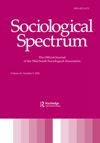收到的信息:亚裔美国人在2016年大选前后的种族、民族和国家身份中心地位
IF 1.1
3区 社会学
Q2 SOCIOLOGY
引用次数: 0
摘要
许多不同的外部因素塑造了亚裔美国人的身份。然而,政治选举对种族、族裔和民族认同的影响研究不足。这项研究探讨了政治选举是否代表了外生冲击的时刻,这种冲击可以塑造亚裔美国人身份的三个不同维度的重要性。这项研究使用了2016年全国亚裔美国人调查(n = 3643)来测试围绕2016年的种族化言论之间的关系 美国总统选举和上述亚裔美国人身份方面。回归分析表明,选举塑造了亚裔美国人种族、民族和族裔认同的中心模式,尽管不同种族群体的情况不同。具体而言,与选举前相比,中国受访者在选举后的美国身份中心地位有所提高,但在任何其他群体中都没有显著变化。另一方面,菲律宾和越南受访者在选举后的种族认同中心性显著下降,而其他群体的种族认同核心性没有发生显著变化。最后,在选举后的韩国受访者中,种族认同中心性只显著下降。这项研究表明,亚裔美国人的这些身份对政治选举等外部事件很敏感,种族化政治言论的影响因种族而异。本文章由计算机程序翻译,如有差异,请以英文原文为准。
Message received: Asian Americans’ racial, ethnic, and national identity centrality before and after the 2016 election
Abstract Many different external factors shape Asian American identity. However, the effect of political elections on racial, ethnic, and national identities has been understudied. This research explores whether political elections represent moments of exogenous shock that can shape the importance of three different dimensions of identities for Asian Americans. This study uses data from the 2016 National Asian American Survey (n = 3,643) to test for a relationship between the racialized rhetoric surrounding the 2016 U.S. presidential election and the aforementioned aspects of Asian American identity. Regression analyses suggest that the election shaped patterns of centrality of racial, national and ethnic identity among Asian Americans, albeit differently across ethnic groups. Specifically, American identity centrality increased for Chinese respondents post-election relative to pre-election, but did not shift significantly for any other group. On the other hand, racial identity centrality significantly decreased for Filipino and Vietnamese respondents post-election, while other groups did not experience a significant change in their racial identity centrality. Finally, ethnic identity centrality only decreased significantly among Korean respondents post-election. This research suggests that these identities among Asian Americans are sensitive to external events, such as political elections, and that the effects of racialized political rhetoric vary across ethnicity.
求助全文
通过发布文献求助,成功后即可免费获取论文全文。
去求助
来源期刊

Sociological Spectrum
SOCIOLOGY-
CiteScore
3.80
自引率
5.60%
发文量
16
期刊介绍:
Sociological Spectrum publishes papers on theoretical, methodological, quantitative and qualitative research, and applied research in areas of sociology, social psychology, anthropology, and political science.
 求助内容:
求助内容: 应助结果提醒方式:
应助结果提醒方式:


